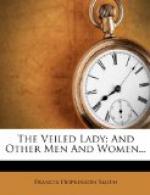I nodded my head.
“Mighty sorry. Don’t any of us talk to him of his dog. What did he say?”
“Nothing. Turned a little pale, got up, and went out.”
“Too bad! You didn’t know, of course—wish I’d posted you.”
“Then he did have a dog?”
“Yes, belonged to that poor girl.”
“What became of him?”
The first officer leaned over the table and rested his elbows on the cloth, his chin in the palms of his hands. For some time he did not speak. Outside I could hear the thrash of the sea and the slosh of spent waves coursing through the deck gutters.
“You want to hear about that dog, do you?” he asked, straightening up. “Well, I can tell you if any man can, but you’re to keep mum about it to the captain.”
Again I nodded.
He fumbled in his outside pocket, drew forth a short pipe, rapped out the dead ashes, refilled it slowly from a pouch on the table, lighted it, and settled himself in his chair.
“I’ll begin at the beginning, for then you’ll understand how I came to be mixed up in it. I saw that dog when he first came aboard, and I want to say right here that the sight of him raised a lump in my throat big as your fist, for he was just the mate of the one I owned when I used to look after my father’s sheep on the hills where we lived. Then, again, I took to him because he wasn’t the kind of a pet I’d ever seen at sea before—we’d had monkeys and parrots and a bobtail cat, but never a dog—not a real, human dog.
“He was one of those brown-and-white combed-out collies we have up in my country, with a long, pointed nose that could smell a mile and eyes like your mother’s—they were so soft and tender. One of those dogs that when he put his cold nose alongside your cheek and snuffed around your whiskers you loved him—you couldn’t help it—and you knew he loved you. As for the captain—the dog was never three feet from his heels. Night or day, it was just the same—up on the bridge, followin’ him with his eyes every time he turned, or stretched out beside his berth when he was asleep. Hard to understand how such a man can love a dog until you saw that one. Then, again, this dog had another hold upon the captain, for the girl had loved him just the same way.
“And he had the best nose in a fog—seemed as if he could sniff things as they went by or came on dead ahead. After a while the captain would send him out with the bow-watch in thick weather, and there he’d crouch, his nose restin’ on the rail, his eyes peerin’ ahead. Once he got on to a brigantine comin’ bow on minutes before the lookout could see her— smelt her, the men said, just as he used to smell the sheep lost on the hillside at home. It was thick as mud—one of those pasty fogs that choke you like hot steam. We had three men in the cro’nest and two for’ard hangin’ over her bow-rail. The dog began to grow restless. Then his ears




